This blog post aims to explore the world of W Series Mind Rubrics extracted from Kent’s Repertory, along with their interpretations.
The focus will be on understanding their psychological significance and the suggested remedies.
Kent’s Repertory plays a crucial role in homeopathy, failing the intricate connection between emotional conditions and physical manifestations.
Table of Contents
ToggleWALKING

Rapidly from anxiety: Arg-n.
Slowly and dignified: Caj.
“WALKING” can express different emotions or states based on the way it’s done:
- Rapidly from Anxiety: When someone walks quickly due to anxiety, it means they’re feeling nervous or worried. Their fast pace shows their inner restlessness and unease.
- Slowly and Dignified: Walking slowly and with dignity implies a composed and respectful manner. This could be in a formal setting or when someone wants to convey seriousness and grace.
In simpler terms, “WALKING” rapidly due to anxiety shows nervousness, while walking slowly and dignified suggests a composed and respectful manner. The way someone walks can reveal their emotions and intentions.
WANDER, desire to

(See Restlessness at R SERIES MIND RUBRICS).
- “WANDER, desire to” means feeling a strong want or wish to explore and travel.
- It’s when you have a strong curiosity and excitement about discovering new places, experiencing different cultures, and going on adventures.
- You feel the urge to roam around, see new sights, and have new experiences.
- This desire is like a yearning for freedom and change, a longing to step outside your usual surroundings and create memorable moments through exploration.
- It’s a feeling of wanting to satisfy your curiosity and embrace the joy of discovering the unknown.
Remedies: Calc-p., verat.
WASHING always, her hands

“WASHING her hands constantly” from a psychological perspective could indicate a behaviour linked to obsessive-compulsive disorder (OCD).
In simpler terms:
“WASHING her hands constantly” suggests a repetitive and compulsive habit where someone feels a strong urge to wash their hands very often, more than what’s typical.
This behaviour often arises from anxiety and a deep fear of germs or dirt.
Washing hands repeatedly is a way for the person to briefly ease their anxiety.
However, this can turn into a cycle, leading them to wash excessively even when there’s no real need.
This behaviour aims to reduce anxiety but can disrupt daily life significantly.
Remedy: Syph.
WEARISOME
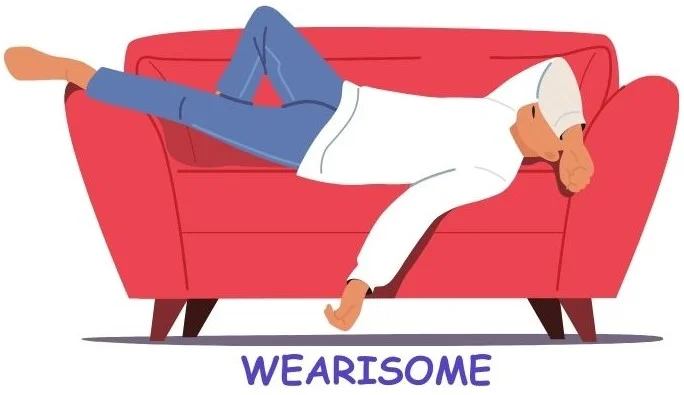
“WEARISOME” describes something that is dull, repetitive, or tiresome, causing a feeling of exhaustion or boredom.
It refers to activities, tasks, or situations that can make you feel weary and uninterested due to their monotonous or burdensome nature.
When something is “wearisome,” it can drain your energy and make you feel mentally or physically fatigued.
This term is often used to express a sense of annoyance or frustration caused by the repetitiveness or lack of excitement in a particular experience.
In simpler words, “wearisome” means something that is boring, repetitive, and makes you feel tired or uninterested.
Remedies: Calc-s., mang., ph-ac., sul-ac.
WEARY OF LIFE
(See Ennui,).
WEEPING, tearful mood

- “Weeping, tearful mood” is an emotional state where intense feelings lead to crying, expressing sadness, grief, or even happiness.
- Tears flow, often with audible distress, releasing emotions and providing relief.
- It’s a natural way to communicate depth of feelings and temporarily reduce stress.
- Weeping evokes empathy and support from others, aiding emotional connection.
- Common and human, it helps process and express emotions, offering catharsis and managing inner turmoil.
Overall, “weeping, tearful mood” lets individuals shed tears as they navigate their feelings, finding solace in this instinctive response to various emotions.
Remedies: Calc., Kali-br., Puls., Nat-m.
WELL, says he is, when very sick

“WELL, says he is, when very sick” suggests a phenomenon where an individual claims to be healthy despite being severely ill. This behavior might stem from various psychological factors:
- Denial: The person might struggle to accept their illness, attempting to convince themselves and others that they are well to avoid facing the reality of their condition.
- Fear of Vulnerability: Admitting sickness could make them feel vulnerable or dependent, so they present a façade of wellness to maintain a sense of control.
- Avoiding Concern: They might downplay their illness to prevent others from worrying or fussing over them, aiming to shield loved ones from distress.
- Psychological Defence: Claiming wellness could serve as a defence mechanism to manage anxiety or emotional distress associated with being sick.
- Maintaining Routine: Some individuals insist on being well to stick to their daily routines and responsibilities, fearing disruption.
- Hope and Positivity: Expressing wellness might be an attempt to cultivate hope and positivity, believing a positive mindset aids recovery.
In summary, “WELL, says he is, when very sick” reflects a complex interplay of psychological factors, including denial, fear, defence mechanisms, and the desire to maintain routine and positivity, despite a significant state of illness.
Remedies: Apis., Arn.
Read meaning of Refuses to take medicines by following the link.
WHIMSICAL (see Mood).
WHINING (see Moaning).
WHISTLING
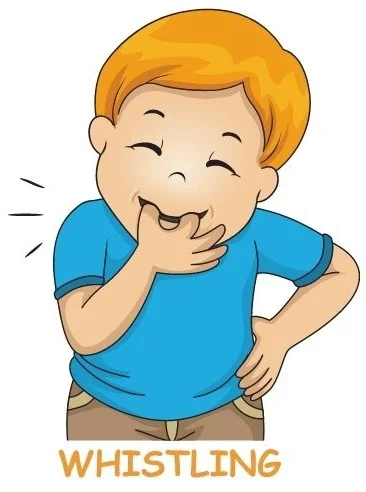
“WHISTLING” involves making a high-pitched sound by blowing air through slightly parted lips. Key points include:
- Sound Creation: Control airflow and mouth shape to produce a unique sound.
- Puckered Lips: Create a small opening with your lips, leaving a gap.
- Airflow Control: Adjust breath force and speed for different pitch and volume.
- Tunes and Melodies: Use whistling to mimic tunes, songs, or melodies.
- Historical Use: Whistling historically aided communication across distances.
- Expressive: Convey emotions like happiness, cheerfulness, or carefreeness.
- Attracting Attention: Grab notice or signal others in a group.
- Cultural Influence: Whistling varies culturally, tied to customs or expressions.
- Enjoyment: Many find whistling relaxing and fun, using it for leisure.
- Skill: Master different techniques through practice for various sounds.
In summary, “WHISTLING” is skilfully creating a distinct sound by blowing air through lips, used to communicate, express, and enjoy.
Remedies: Croc., lach., plat., stram.
WICKED disposition

See Malicious by following the link.
A “WICKED disposition” means having a personality that tends to do mean or hurtful things. Here are the main points:
- Mean Behaviour: It’s about being inclined to do things that can harm or hurt others.
- Doing Wrong: This is when actions go against what’s right or what most people think is good.
- Wanting to Hurt: It suggests having a tendency to make others feel bad or unhappy.
- Being Dishonest: It’s like having a tendency to lie or not tell the truth.
- Bad Influence: This can affect relationships by making them difficult or unpleasant.
- Not Kind: It’s against the idea of being nice, caring, or treating others well.
- Bad Outcomes: It can lead to problems and not-so-good results.
- Impact on Others: A wicked disposition affects not just you, but also the people around you.
In short, a “WICKED disposition” is when someone tends to be mean, hurtful, or dishonest, which can create problems in how they act and relate to others.
Remedies: Cocc., cur.
WILD feeling in head

“WILD feeling in head” refers to an unusual and intense sensation or experience within the head. Here’s a simple explanation:
- Unusual Sensation: It’s about having a feeling in your head that is different from what you usually feel.
- Intensity: The sensation is strong and stands out, not like normal feelings.
- Not Controlled: It might feel like the sensation is happening on its own, without you making it happen.
- Different from Normal: This feeling is not what you typically feel in your head.
- Possibly Strange: It could be a sensation that you haven’t felt before or that feels odd.
- Variety of Causes: Many things, like stress, illness, or even excitement, can lead to this kind of feeling.
- Temporary: Often, these sensations don’t last long and might go away on their own.
- Awareness: It’s important to pay attention to how you’re feeling and seek help if it’s concerning or persistent.
- Not Just Physical: Sometimes, emotions or anxiety can also create this kind of sensation.
- Individual Experience: Everyone might describe this feeling differently, but it’s about something unusual happening in your head.
In simple words, a “WILD feeling in head” is when you sense something unusual or intense happening in your head, which could be due to different reasons.
Remedies: Bapt., med.
WILDNESS
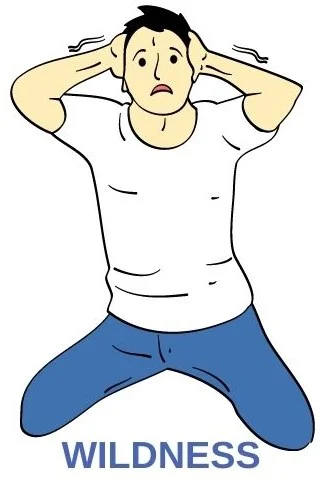
“WILDNESS” in psychological terms refers to a state of heightened and uncontrolled emotions or behaviours.
It’s when feelings become intense and difficult to manage, leading to impulsive actions or reactions.
This can result from overwhelming stress, excitement, or underlying emotional issues.
In this state, rational thinking might be temporarily overshadowed by strong emotions.
Managing wildness involves recognizing triggers, developing coping skills, and seeking therapy if needed.
It’s a transient state where emotions temporarily take over, highlighting the importance of emotional regulation and self-awareness for psychological well-being.
Remedies: Stram., verat.
WILL, contradiction of
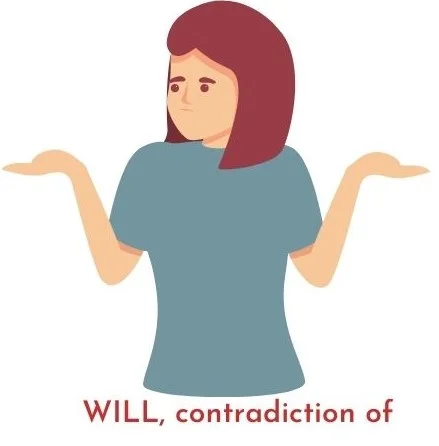
- “WILL, contradiction of” refers to a situation where a person’s desires or intentions conflict with each other.
- It’s when someone wants two different things that are opposing or incompatible.
- This can create inner confusion and uncertainty, making it difficult to make a clear decision or take action.
- The contradiction of will often occurs when there’s a struggle between different priorities, values, or emotions.
- It’s like having mixed feelings about what to do or choose.
- Resolving this contradiction involves introspection, weighing pros and cons, and finding a balance between conflicting desires to make a decision that aligns with one’s overall goals.
Remedy: Anac.
WITTY

- “WITTY” refers to the quality of being clever, quick-minded, and humorous in a way that amuses and impresses others.
- A witty person has the ability to make clever remarks, jokes, or observations that show intelligence and a keen sense of humour.
- Witty individuals often use wordplay, sarcasm, or clever twists of language to entertain and engage people.
- Their remarks are often unexpected and can bring laughter or thought-provoking insights.
- Being witty involves thinking on your feet and expressing ideas in a sharp, amusing, and imaginative manner, which can make conversations enjoyable and light-hearted.
Remedies: Coff., lach., op.
WOMEN, aversion to
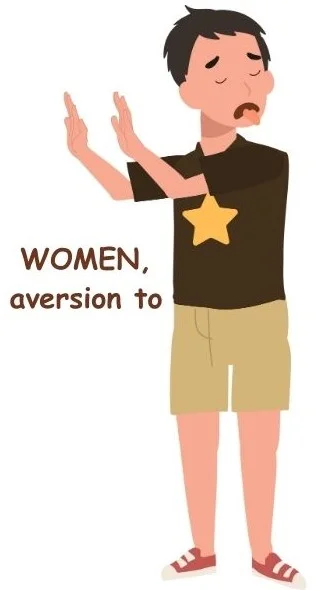
“WOMEN, aversion to” refers to a strong feeling of dislike, discomfort, or reluctance towards interacting with or being around women.
It can manifest as avoidance, unease, or anxiety when engaging in conversations, socializing, or forming relationships with women.
This aversion might stem from various factors such as past experiences, cultural influences, or personal beliefs.
It can impact social interactions, limit opportunities for connection, and hinder the ability to build healthy relationships with women.
Addressing this aversion may involve self-reflection, understanding underlying reasons, and gradually working towards developing more positive and respectful attitudes towards women.
Remedies: Dios., lach., puls.
WORK, aversion to mental
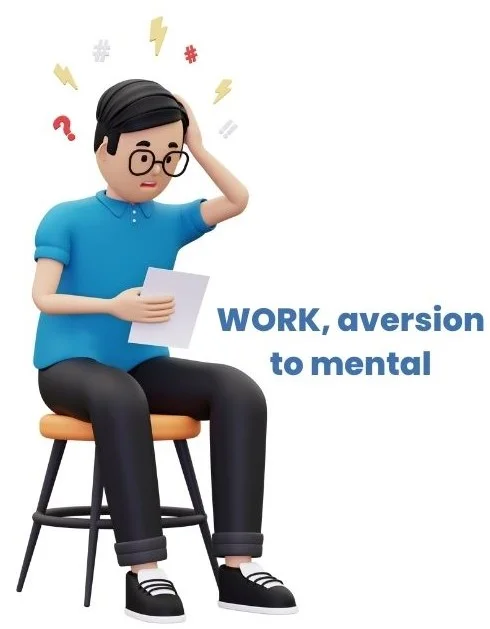
Read PROSTRATION/MENTAL EFFORT inability to sustain from P SERIES MIND RUBRICS FROM KENT’S REPERTORY.
- “WORK, aversion to mental” refers to strongly disliking or hesitating to do tasks that involve thinking, like studying or problem-solving.
- It’s when you avoid these tasks because they don’t feel enjoyable.
- This dislike might come from feeling overwhelmed, bored, or stressed.
- It can affect learning and productivity.
- Reasons could be past bad experiences or feeling pressured.
- To cope, you can make tasks more engaging or seek help.
- Over time, you can improve by finding strategies to make these tasks feel better.
In essence, it’s about not liking mental work, which can impact learning and productivity.
Remedies: Chel., Chin., Lec., Nux-v., Phos.
WRITING

“WRITING” is the process of converting thoughts into written words, allowing expression of feelings, ideas, and creativity.
Through it, people communicate across time and space, using tools like pens or keyboards.
Language skills form coherent text with structure, often including introduction, body, and conclusion.
Editing refines content for clarity, and writing can happen in books, emails, or articles.
It’s a creative outlet for narratives, poems, or arguments.
Also, writing records history, research, and personal experiences, aiding communication and organization of complex ideas.
In essence, it captures thoughts tangibly, enabling communication, expression, and knowledge preservation.
Aversion to: Hydr., squil., thea.
Desire for: Chin., spig.
Difficulty in expressing ideas when: Cact., carb-an.
Inability for: Ign., lyc.
WRONG, everything seems

“WRONG, everything seems” describes a subjective perception where an individual perceives everything around them as being incorrect, unfavourable, or out of order. This perception can be influenced by various psychological factors:
- Negative Cognitive Bias: The person’s mindset is inclined towards focusing on the negative aspects of situations, leading them to perceive things as wrong even when they might not be objectively incorrect.
- Emotional State: Negative emotions such as stress, anxiety, or sadness can distort one’s perception, making even ordinary situations seem wrong or problematic.
- Pessimistic Outlook: A pessimistic worldview can lead someone to interpret events as going awry, reinforcing the belief that everything is wrong.
- Cognitive Filtering: The individual might filter out positive or neutral aspects, magnifying perceived wrongness in their environment.
- Perceived Control: When someone feels out of control, they might interpret events as wrong as a way to regain a sense of control over their surroundings.
- Previous Experiences: Past negative experiences can colour one’s perception, making it more likely to view current situations as wrong.
Overall, “WRONG, everything seems” reflects a psychological state where negative biases, emotions, and interpretations contribute to perceiving the world as consistently unfavourable or incorrect, even if that might not be the objective reality.
Remedies: Naja., nux-v.






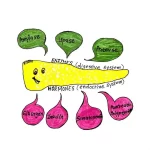
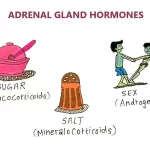

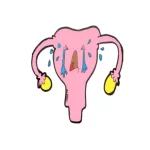
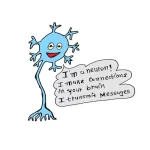
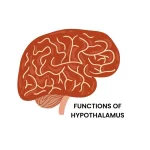

Leave a Reply